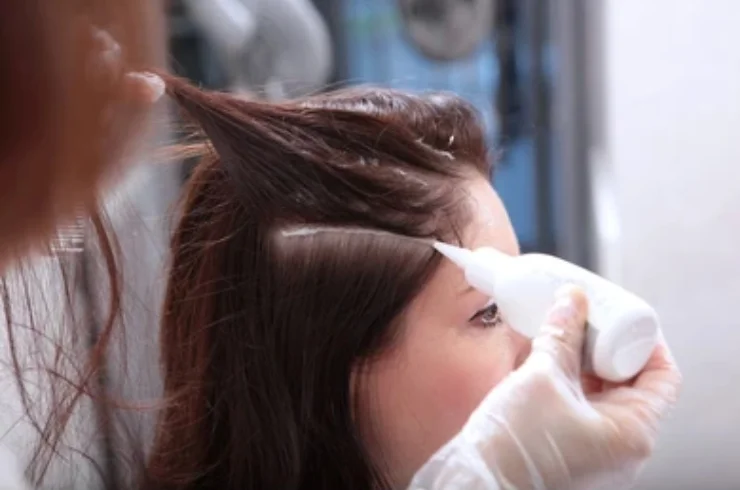Understanding Hair Loss:
Hair loss, also known as alopecia, can occur for various reasons. Common types of hair loss include:
- Androgenetic Alopecia (Male or Female Pattern Baldness): This is the most common type, often caused by genetics and hormonal changes.
- Telogen Effluvium: This is a temporary form of hair loss that can be triggered by stress, illness, childbirth, or changes in medication.
- Alopecia Areata: This autoimmune condition causes patchy hair loss.
- Tinea Capitis (Scalp Ringworm): A fungal infection that can cause hair loss.
- Traction Alopecia: Hair loss caused by tight hairstyles or repeated pulling on the hair.
Diagnosis:
The first step in effective hair growth treatment is an accurate diagnosis. Our dermatologists will:
- Medical History: Review your medical history, including any medications you’re taking and any family history of hair loss.
- Physical Examination: Examine your scalp and hair to assess the pattern and severity of hair loss.
- Diagnostic Tests: May include:
- Scalp Biopsy: To examine a small sample of scalp tissue under a microscope to identify the cause of hair loss.
- Blood Tests: To check for underlying medical conditions that may be contributing to hair loss, such as thyroid disorders or iron deficiency.
- Hair Pull Test: To assess the extent of hair shedding.
- Trichoscopy: Using a special instrument with magnification to view the scalp and hair shafts.
Treatment Options:
Based on your diagnosis, our dermatologists will create a personalized treatment plan that may include one or more of the following:
- Medications:
- Minoxidil (Rogaine): A topical medication that can stimulate hair growth.
- Finasteride (Propecia): An oral medication that blocks the hormone DHT (dihydrotestosterone), which can contribute to hair loss in men.
- Spironolactone: An oral medication that can be used to treat hair loss in women.
- Corticosteroids: Can be used to treat alopecia areata to suppress the immune system.
- Topical Treatments:
- Corticosteroid creams or lotions: for conditions like alopecia areata.
- Procedures:
- Platelet-Rich Plasma (PRP) Therapy: PRP therapy involves injecting a concentrated solution of the patient’s own platelets into the scalp to stimulate hair follicles. This therapy promotes healing and can improve hair growth.
- Mesotherapy: Involves injecting a mixture of vitamins, minerals, and other growth factors directly into the scalp to stimulate hair follicles.
- Low-Level Laser Therapy (LLLT): Uses low-level lasers to stimulate hair follicles and promote hair growth.
- Hair Transplantation: A surgical procedure that involves transplanting hair follicles from a donor area (usually the back of the head) to areas with hair loss. This procedure is offered by our experienced and highly skilled surgeons at Raneshwar Multispecialty Hospital.
- Nutritional Supplements:
- Biotin: May help improve hair strength and growth.
- Iron: For iron deficiency.
- Zinc: May help to improve hair health.
- Vitamin D: May help to promote hair growth.
- Lifestyle Modifications:
- Healthy Diet: Eating a balanced diet rich in vitamins, minerals, and protein is essential for healthy hair growth.
- Stress Management: Managing stress can help to prevent or reduce hair loss.
- Avoiding Tight Hairstyles: Avoid hairstyles that pull on the hair, such as tight braids or ponytails.
Dandruff Treatment:
Understanding Dandruff:
Dandruff is a common condition that causes flakes of dead skin to shed from the scalp. It can be caused by several factors, including:
- Seborrheic Dermatitis: A chronic inflammatory skin condition that can cause flaky, oily skin on the scalp.
- Malassezia Globosa: A yeast-like fungus that is naturally present on the scalp but can overgrow and cause dandruff.
- Dry Skin: Dry skin can also cause flaky scalp.
- Contact Dermatitis: An allergic reaction to hair care products.
Diagnosis:
Our dermatologists can diagnose dandruff through a physical examination of the scalp.
Treatment Options:
- Over-the-Counter (OTC) Shampoos:
- Antifungal Shampoos: Contain ingredients like ketoconazole, selenium sulfide, or zinc pyrithione to control fungal overgrowth.
- Tar-Based Shampoos: Help to slow down the production of skin cells.
- Salicylic Acid Shampoos: Help to exfoliate the scalp and remove dead skin cells.
- Prescription Shampoos:
- Ketoconazole: A stronger antifungal medication.
- Corticosteroid Shampoos: To reduce inflammation and itching.
- Topical Treatments:
- Corticosteroid lotions or solutions: For conditions like seborrheic dermatitis.
- Lifestyle Modifications:
- Gentle Shampooing: Washing your hair regularly with a gentle shampoo can help to remove flakes and oil.
- Avoiding Irritants: Avoid using hair products that contain harsh chemicals or fragrances.
- Sunlight Exposure: Moderate sunlight exposure can sometimes help to improve dandruff.
Why Choose Raneshwar Multispecialty Hospital for Hair Growth & Dandruff Treatment?
- Expert Dermatologists: Our team of experienced dermatologists specializes in diagnosing and treating hair and scalp conditions.
- Comprehensive Diagnostic Evaluation: We use advanced diagnostic tools to accurately identify the cause of your hair loss or dandruff.
- Personalized Treatment Plans: We create customized treatment plans to address your individual needs and achieve the best possible results.
- Advanced Treatment Options: We offer a wide range of cutting-edge treatments, including medications, procedures, and lifestyle recommendations.
- Compassionate Care: We provide compassionate and supportive care throughout your treatment journey.
- State-of-the-Art Facilities: Our hospital is equipped with state-of-the-art facilities to ensure the highest standards of care.
- Multidisciplinary Approach: If needed, we collaborate with other specialists to provide comprehensive care.
Book Your Consultation Today!
Regain your confidence with healthy hair and a clear scalp. Contact us today to schedule your consultation at Raneshwar Multispecialty Hospital and take the first step towards a healthier and more vibrant you.
